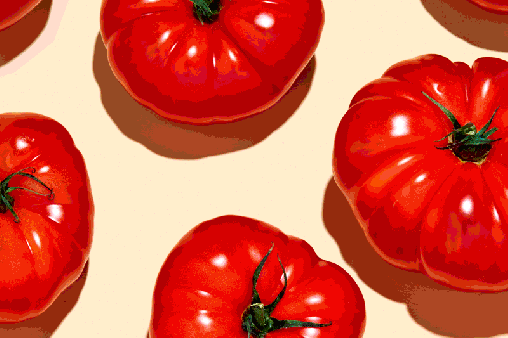
Published on Feb 05, 2024
Last modified on Dec 23, 2025
Mediterranean Diet During Menopause: Benefits, Tips, Recipes & More
5 min read
While there is no one best diet for everyone, the Mediterranean diet (or Med diet for short) gets a lot of hype — and for good reason. It’s been associated with better cognition, mental health, weight loss, sleep, cardiovascular health, brain fog, joint and muscle aches, reduced risk of chronic diseases…you name it.
Below we dive into the science behind why this way of eating is so powerful for our overall health and quality of life. We’re also sharing practical tips, ingredient swaps, recipes, and grocery lists to help you add some ~Mediterranean flair~ to your plate.
Mediterranean diet 101
The Mediterranean diet is less of a strict diet per se and more of a guideline with key principles to adhere to. It’s largely inspired by the foods of southern Italy, southern Spain, and Crete — and while people have been eating this way for centuries, the concept as it exists today originated in the early 1960s.
What’s included:
- Fruits & vegetables
- Seafood: cod, wild salmon, sardines
- Beans & legumes: chickpeas, lentils, cannellini beans
- Whole grains: farro, polenta, barley
- Herbs & spices: basil, mint, parsley, oregano
- Healthy fats: avocado, nuts/seeds, extra virgin olive oil
What’s partially included (but in moderation):
- Red meat & poultry
- Eggs
- Dairy products: cheese, yogurt, butter
- Red wine
What’s not included:
- Processed foods
- Refined grains: white flour, white bread, white rice
- Refined/added sugars: high-fructose corn syrup, cane sugar
- Sugar-sweetened beverages & cereals
- Refined oils: canola oil, vegetable oil, margarine, corn oil
Health benefits of the Mediterranean diet during menopause
The whole food, plant-forward Mediterranean-style diet is naturally low in saturated fats and cholesterol but rich in antioxidants, fiber, and healthy fats. It’s also anti-inflammatory, low-carbohydrate, and low-sugar.
And while this all sounds great, you may be wondering…how will this impact my menopause symptoms and help me feel better?
Hot flashes & night sweats
Food can be a powerful tool to help minimize hot flashes both directly (by supporting our hormonal health, specifically cortisol and insulin) and indirectly (by promoting cardiovascular health and weight loss).
Many of the foods Elektra’s experts recommend for hot flashes fall within the umbrella of the Mediterranean diet, including:
- Ground flaxseed, which contains phytoestrogens. These plant-based compounds are, at a molecular level, similar to that of estrogen and mimic the role of this key hormone in the body, thus helping with hormonal fluctuations. Flaxseed is also a great source of fiber and omega-3 fatty acids.
- Legumes such as chickpeas and lentils are weaker sources of phytoestrogens that may help in reducing hot flashes.
Brain fog
Because brain fog during perimenopause is linked to shifting hormones, it’s short term compared to something like overall cognitive health, which is more of a long-term consideration. There are certain foods included in the Mediterranean diet that are great for long-term brain health and MAY also help in the short term by supporting hormonal health: dark leafy greens, berries, extra virgin olive oil, and flaxseed oil.
READ MORE: 8 Foods That Help With Menopausal Brain Fog (plus key differences between brain fog and Alzheimer’s)
Depression & anxiety
Mood changes in the form of anxiety and depression are increasingly common during the menopause transition due to hormonal changes in estrogen, serotonin, progesterone, and GABA.
There is a strong positive correlation between a plant-based Mediterranean diet and a lower risk of anxiety and depression. However, severe symptoms that prevent you from functioning, disrupt relationships, and/or are associated with suicidal thoughts merit urgent medical attention and pharmacologic therapy as first steps.
Joint & muscle aches
Pesky joint and muscle aches are common menopause symptoms that can manifest as achy, stiff, creaky feelings (sometimes with a slight burning sensation, too). While there are many potential causes, inflammation is a big one — that’s where the Mediterranean diet can help.
Bone health
Of the estimated 10 million Americans with osteoporosis, roughly eight million are women. And get this: 50% of women over the age of 50 will break a bone because of osteoporosis.
In order to support our bone health, we need to get adequate calcium (1,000 – 1,200 mg daily) preferably from food sources. Fortunately, many of the foods included in the Mediterranean diet are naturally rich in both calcium and vitamin D (which facilitates calcium absorption).
READ MORE:
- Calcium During Menopause: How Much Do We Really Need & How Can We Get It?
- Is There A Test For Bone Density? Should We Be Getting It?
- Elektra’s Full Guide To Osteoporosis
Heart health
During our reproductive years, estrogen helps protect our heart due to its positive effects on cholesterol production, blood vessels, and inflammation. As estrogen levels fluctuate and eventually decline, we lose much of that protection. Combine that with the fact that menopause is associated with an increase in blood pressure, body mass index (BMI), and body fat distribution, and what we get is a perfect storm of risk factors for cardiovascular diseases.
The Mediterranean diet prioritizes plant-based food with very little if any red meat, high-fat dairy, fried foods, and refined oils, making it naturally low cholesterol and ideal for women’s health during this time.
READ MORE:
Weight gain
Weight gain (with that stubborn belly fat!) is common during menopause due to a whole slew of reasons: hormonal fluctuations, general slowing of metabolism with age, lifestyle changes, and even genetics.
Because the Mediterranean diet is low glycemic, it doesn’t dramatically spike our blood sugar. This is what we want since increased glucose (aka sugar) levels leads to increased insulin/insulin resistance, which leads to weight gain.
READ MORE: To support healthy weight maintenance and muscle mass during menopause, it’s important to pair diet with physical activity. Here are 3 exercises to try. And if you’re a perimenopausal or postmenopausal woman considering HIIT to help shed body weight, read this first!
Helpful tips & ingredient swaps
- Swap out butter for extra virgin olive oil when making your morning eggs.
- If you’re eating out, ask if your meat can be grilled rather than fried.
- Struggling with finding good snacks? Reach for a handful of dry-roasted nuts, carrots and hummus, or a hard-boiled egg with salt and pepper.
- Not sure what forms of dairy to include in a Mediterranean diet? As a rule of thumb, it’s best to opt for plain yogurt (you can flavor it yourself with fresh fruit or honey) and go Greek when possible for the added protein.
- Remember, one of the reasons the Mediterranean diet is so sustainable is that there’s no need to count calories or meticulously track macronutrients. But if you’re worried about getting sufficient protein, carbohydrates, or healthy fats, consider working with your healthcare provider and/or a Registered Dietitian-Nutritionists (RDN).
Mediterranean diet recipes to get the creative kitchen juices flowing…
When looking for recipes, we prioritize flavor, of course, but also accessibility. Because who has time for a lengthy and complicated cooking project on a Tuesday? No, thank you.
A sample Mediterranean diet grocery list
Foods will change based on what’s in-season (citrus in the winter and berries in the summer, for example), but this is a good starting point.
🍋 Fruits
- Berries
- Apples
- Citrus (lemons, oranges, grapefruits)
- Cherries
- Grapes
- Figs
- Dates
- Apricots
🥬 Vegetables
- Greens (chard, kale, spinach, arugula)
- Herbs (parsley, basil, oregano, thyme, dill, sage, rosemary)
- Cabbage
- Brussels sprouts
- Onions
- Garlic
- Zucchini
- Beets
- Peppers
🐟 Seafood
- Cod
- Wild salmon (fresh or canned)
- Sardines
- Mackerel
- Herring
- Branzino
🍗 Meat & poultry
- Chicken
- Turkey
🫘 Beans & legumes
- Chickpeas
- Lentils
- Cannellini beans
- Fava beans
- Lupini beans
- Pinto beans
- Peas
🌾 Whole grains
- Farro
- Polenta
- Barley
- Oatmeal
- Brown rice
- Buckwheat
🥑 Healthy fats
- Avocado
- Nuts (almonds, walnuts, pine nuts, hazelnuts)
- Seeds (pumpkin seeds, sesame seeds, flaxseeds)
- Extra virgin olive oil
READ MORE:


